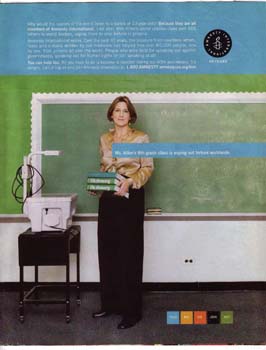
ad, featuring the line "Ms. Allen's 8th grade class is
wiping out torture worldwide."
Kim Allen ’84 teaches 7th and 8th grade at St. Luke’s School in New York City: homeroom, social studies, Spanish and something even more important – social justice and global citizenship. In and out of the classroom, she demonstrates her commitment to a better world.
Her involvement with human rights began in her own family. Her parents were Quakers, active in the civil rights movement, and in Allen’s second-grade year they volunteered her to be one of the first students in Wichita to integrate.
Later, in 1975, they helped establish Emerson Open Magnet, with its creative, informal approach to education; Allen was one of the first two eighth-graders.
At Wichita State, Allen studied history and political science under such outstanding teachers as William Richardson and John Millet.
She won the Harry S. Truman Scholarship for Public Service in 1982 — a coup for WSU, she says, because it usually went to a KU student — and was able to study in London, serving an internship in the British Parliament.
“It was there that I first learned who Nelson Mandela was, that I went to Belfast and learned firsthand what a city under occupation was like,” she recalls.
She received her BA from WSU in 1984 (magna cum laude, with a minor in Spanish) and a master’s degree in curriculum and instruction from KU in 1988.
Since then, she has taught in the Wichita public school system, at the Eurolanguage Academy in Madrid and the American Overseas School of Rome, before arriving at St. Luke’s in 1996.
At an age when their intensity and indignation can be wasted on trivialities, Allen’s students channel their classroom energies elsewhere under her guidance. “If you’re well-educated, you’re going to say, ‘Wait a minute,’” she explains. “Rather than having them rebel against their parents about going out for pizza after school, they can get angry about what life is like for poor people in the world, about this war they’re always in the shadow of.”
It’s crucial, she adds, for adults to see young people as capable participants in changing things for the better and to share the work with them. “Kids at the age I teach are great for inspiring adults,” she says. “They see all this injustice, and we don’t let them act on it. It’s important for us to acknowledge that what these kids see wrong in the world – they’re right about.”
Allen’s students are very active with Amnesty International, even appearing in a 2001 print ad that ran in publications such as the New Yorker. During one school year, her students generated more than a thousand letters. Her eighth graders enjoyed a unique graduation gift: the release of Leyla Zana, a Kurdish activist who spent nine years in a prison in Turkey. This year, they’ve written to the CEO of McDonald’s about migrant worker’s rights – and again saw results in April when the fast-food chain agreed to pay more for tomatoes picked by these laborers.
Allen and her St. Luke’s students are also involved in outreach closer to home. “Last Friday I took students to a food pantry after school,” she relates. “Tomorrow, I’m going with 50 kids on an AIDS Walk we’ve raised $21,000 for.” In addition to their work at the St. Clement’s Food Pantry and the Gay Men’s Health Crisis AIDS Walk, Allen’s students have developed a partnership with Peter’s Place, a homeless shelter for the elderly, and a “buddy” relationship with a public school for new immigrants called Newcomers High School. In 2000, Allen helped the school develop a curriculum based on her travel and study in Morocco.
Though she laughs that she didn’t decide for sure on teaching as a lifelong career until about five years ago, it’s clear that her passion for human rights finds a perfect outlet in her work in education.
Outside of the classroom, Allen’s projects are equally numerous. For instance, she serves on the advisory council of HERvoices, Inc., an organization out of Provincetown, Mass., that, according to its website, seeks “to increase tolerance and decrease violence locally and globally by including more women and girls in the conversation.” Recently, she represented HERvoices at the Iranian Diaspora Conference at NYU and established contacts for a new “HERvoices: Iran” project.

left, learns "the secrets of hemp" from Hmong
women. While there, she documented a micro-loan
program for local women in the Quang Ngai province.
In 2005, she traveled to Vietnam to co-produce an award-winning documentary film, Kieu.
Her brother, Kevin Allen, was the director and primary artist behind the film, which chronicles the memories and voices of two Vietnamese immigrants who grew up in Wichita. While in Vietnam, she also documented a micro-loan program for local women in the Quang Ngai province, near the site of the My Lai massacre.
After years involved in worldwide causes, Allen found herself learning about local politics when a developer bought her Manhattan building in 2005, threatening to evict her and 78 other tenants: teachers, actors and social workers who couldn’t afford the new high prices of their real estate.
So she founded the Parc Place Affordable Housing Tenant Group, working with lawyers to lobby elected officials and city agencies on behalf of her neighbors.
Recently, their efforts paid off – the tenants will be able to remain in their homes for the next 12 years. This building is located right in front of Ground Zero.
“Being a witness to the destruction and devastation of a terrorist attack is a peculiar kind of privilege,” she says. “I live with an understanding of the fear and loss that people all over the world experience every day. Those especially difficult first months when I could not live at home created a sense of being an actor in history. The only response was – and always will be – to roll up my shirtsleeves and get down to work.”





